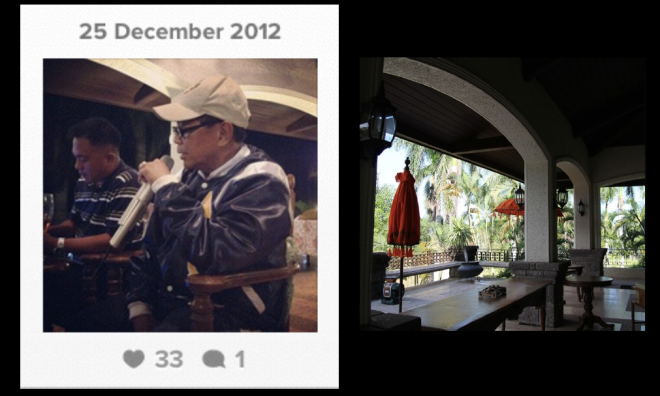Binay can be ‘investigated, charged, tried, and even convicted’—Cayetano

Vice President Jejomar Binay (right) has refused to be drawn into a word war with Sen. Alan Peter Cayetano (left), another probable presidential contender who had said that the economy would suffer if Binay were elected president in 2016. INQUIRER FILE PHOTOS
MANILA, Philippines – Vice President Jejomar Binay may be haled to court, according to Senator Alan Peter Cayetano, who is challenging the general notion that since the vice president may be removed from office only by impeachment, he is immune from suit as well.
Cayetano told reporters Friday only the President was immune from suit among government officials who are impeachable under the 1987 Constitution.
The rest of the impeachable officials—the vice president, Supreme Court justices and constitutional commission members —are not, the senator said.
“They can be investigated, charged, tried and even convicted,” he added.
Cayetano said that the 1973 Constitution had a specific provision guaranteeing the immunity of the President and the other executive officers.
He cited Article VII, Section 15 which states: “The President shall be immune from suit during his tenure. Thereafter, no suit whatsoever shall lie for official acts done by him or by others pursuant to his specific orders during his tenure.”
The senator, however, pointed out that the 1987 Constitution did not preserve this provision.
“When Commissioner [Jose] Suarez suggested that the President’s immunity should at least be preserved, Father [Joaquin] Bernas replied that it was already understood in Philippine jurisprudence (Forbes v Chuoco Tiaco and Crossfield) that the President may not be sued during his tenure,” he said.
Binay is now the subject of a Senate inquiry into the allegedly overpriced P2.28-billion Makati carpark called by Cayetano and Sen. Antonio Trillanes IV.
He has been accused of pocketing kickbacks from infrastructure deals with a favored contractor, and of owning a P1.2-billion, 350-hectare estate in Rosario, Batangas province.
 The Ombudsman has begun investigation of a plunder complaint against him in connection with the same carpark, and the Department of Justice has also joined the investigation of anomalies in Makati.
The Ombudsman has begun investigation of a plunder complaint against him in connection with the same carpark, and the Department of Justice has also joined the investigation of anomalies in Makati.
In justifying the parallel investigation, Justice Secretary Leila de Lima said the vice president was immune from suit, but not from investigation.
Citing American jurisprudence, Cayetano argued that there was no absolute immunity for the vice president.
In the United States, two vice presidents — Aaron Burr (1801-1805) and Spiro Agnew (1969-1973) — performed their duties while facing criminal charges, he said.
Burr faced murder charges and later, treason, while Agnew was charged with extortion, bribery and income tax violation, he added. Agnew pleaded no contest and was forced to resign.
 In the Philippines, Cayetano said, there was no legal basis for immunity from suit for the vice president.
In the Philippines, Cayetano said, there was no legal basis for immunity from suit for the vice president.
“Even if there was such an immunity, considering that the presidential immunity from suit remains qualified/limited notwithstanding long-established legal basis for the same, there is reason to argue that the vice president enjoys only a very limited/qualified immunity,” he said.
In the case Soliven v Judge Makasiar, the high court explained that the grant of immunity to the President was to “assure the exercise of presidential duties and functions free from any hindrance or distraction…” given that the job demands undivided attention, Cayetano said.
“But this privilege of immunity from suit pertains to the President by virtue of the office, and may be invoked only by the holder of the office, not by any other person in the President’s behalf,” the court added.
Trillanes had expressed the same view that the vice president was not immune from suit. That’s why, he said, he preferred that Binay be charged in court rather than be impeached.
Senator Aquilino Pimentel III, chair of the Blue Ribbon subcommittee, said that the President enjoyed immunity from suit because of his full-time job. This could also apply to Binay because he’s been given several jobs, including as head of the government’s housing agency and as presidential adviser on overseas workers affairs, he said.
Otherwise, under the Constitution, the vice president is a “spare tire”.
In an earlier interview, however, Pimentel said the vice president “can’t be charged if we blindly accept the doctrine that impeachable officials are immune from suit while in office until impeached.”
Pimentel had agreed that the impeachable officials were not immune from investigation.
“So you can proceed with the investigation up to a point where you refrain from filing the actual information or pleading which will initialize the suit. You can only go up to there,” Pimentel said. “As soon as the immunity is lifted, you can file immediately.”
RELATED STORIES
Cayetano cites Instagram posts as proof of Binays’ farm ownership
Binay daughter’s Instagram post: ‘Our place in Batangas’
Village folk readily say Binays own hacienda
RELATED VIDEOS














